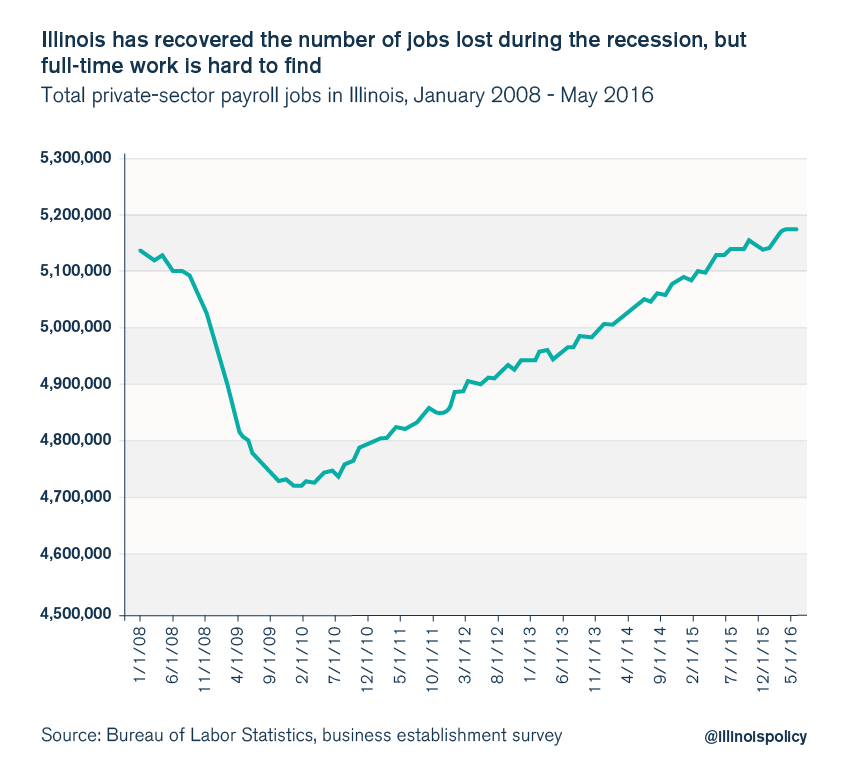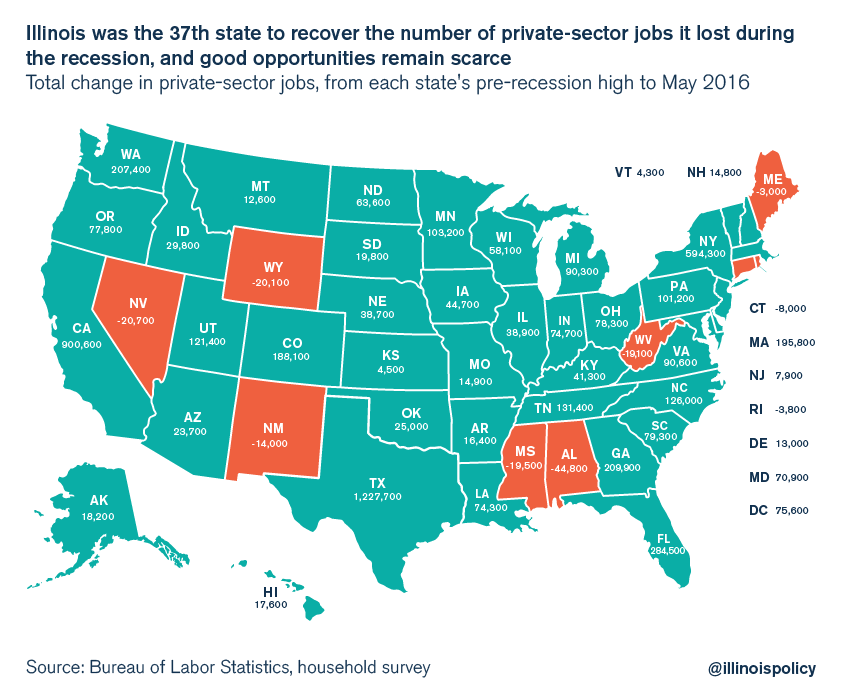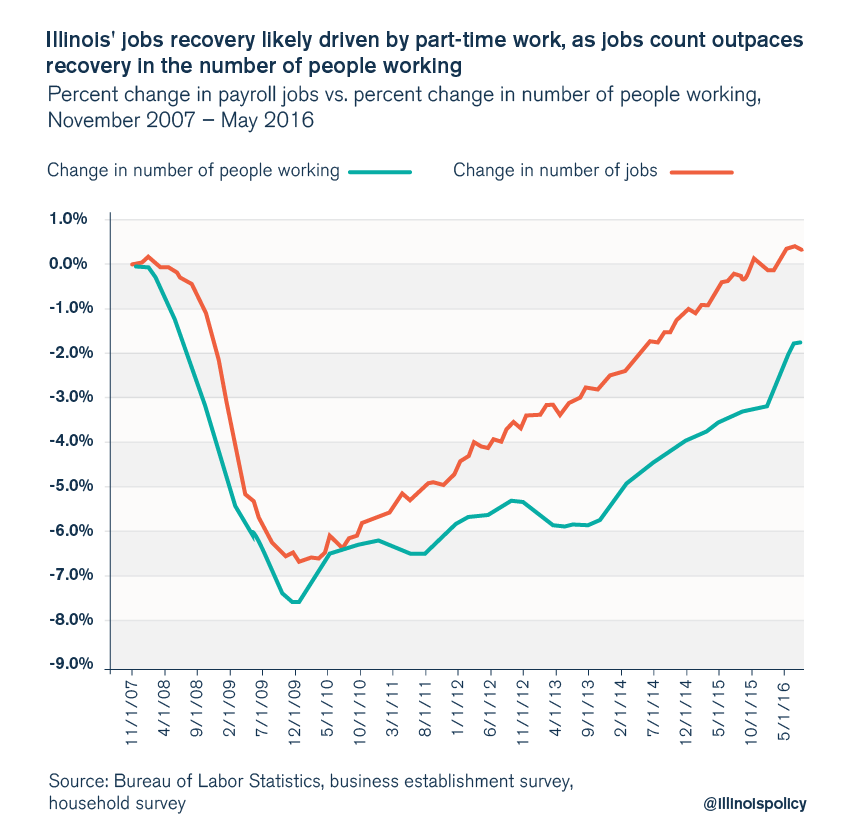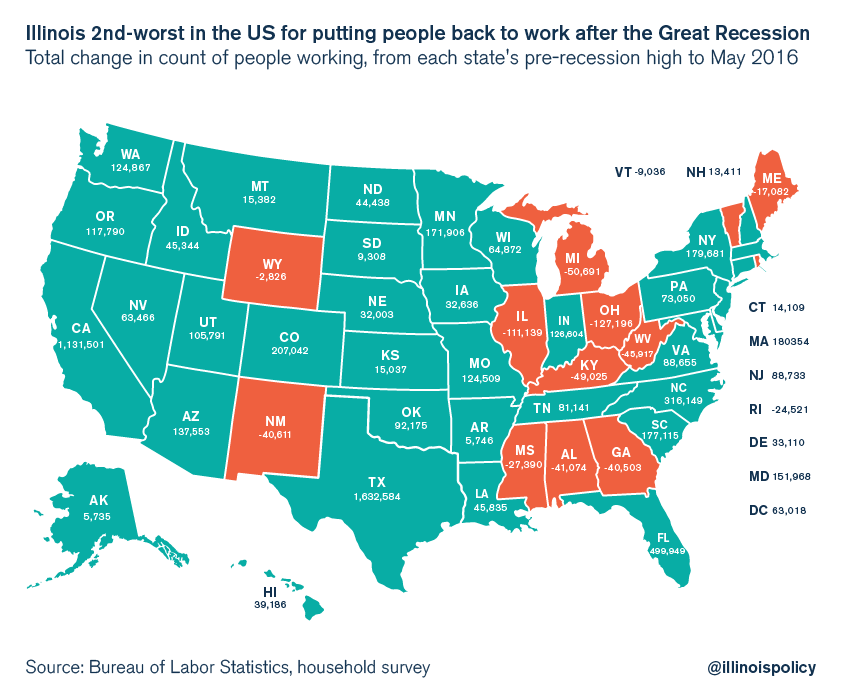Illinois one of few states still recovering from the Great Recession
Most states have far outstripped Illinois on the number of jobs recovered. And even worse, Illinois has also lagged in the quality of jobs recovered. Illinois was the 37th state to recover and match its pre-recession jobs count. But there are still 110,000 fewer Illinoisans working today than before the recession began.
Illinois is one of a handful of states that is still struggling to put people back to work after the Great Recession. Just consider: Though Illinois now has 39,000 more private-sector payrolls jobs now than it had before the Great Recession began, there are 110,000 fewer Illinoisans working than before the recession began.
Illinois’ recovery has been tripped up by anti-jobs regulations, staggering debt problems and painful tax hikes. While surrounding states have attracted new investments and jobs growth, hard-working families in Illinois have been left behind because the state simply hasn’t put its house in order. This has resulted in weak growth and a struggling jobs recovery likely driven by part-time work.

Illinois lost 412,000 private sector jobs during the two years of jobs losses from the Great Recession, according to the Bureau of Labor Statistics, or BLS, business establishment survey. It took five and a half years for Illinois to recover that jobs count, and by July 2015 Illinois had the same number of private sector jobs as before the recession began. However, labor market data indicate that Illinois is likely still lagging in recovering high-quality, full-time jobs, and a significant part of the jobs recovery has been driven by part-time work.
Illinois was the 37th state to recover and match its pre-recession jobs count. The most recent month of jobs data from May 2016 shows that Illinois now has 39,000 more private-sector payroll jobs than it had before the recession began.

Most states have far outstripped Illinois on the number of jobs recovered. And even worse, Illinois has also lagged in the quality of jobs recovered. The BLS data include a second survey, which provides a count of the number of people working in each state instead of the number of jobs. This second survey, known as the household survey, shows that Illinois still has 111,000 fewer people working today compared to before the recession began, leaving Illinois a long way from recovery.
What does this mean? The BLS business survey says Illinois has more jobs than before the recession, but the BLS household survey says Illinois has fewer people working over the same timeline. It’s likely explained by the fact that Illinois’ jobs recovery has been driven by lower-paying part-time jobs rather than higher-quality, full-time jobs. When a person gains two part-time jobs instead of one full-time job, the jobs count advances more quickly than the count of people working.
And that’s exactly how Illinois’ recovery looks. The jobs count has bounced back significantly faster than the count of people working. The recovery gap between the number of jobs and the number of people working in Illinois likely points to a recovery marked by fewer workers but more part-time jobs.

When it comes to putting people back to work after the recession, Illinois is one of the worst states in the country. There are still 110,000 fewer Illinoisans working compared to before the Great Recession, putting Illinois in the company of only Ohio and Michigan for worst recovery over the recession timeline. However, Ohio and Michigan each experienced the collapse of the auto industry, and hemorrhaged jobs losses for about a year longer than Illinois did. Furthermore, they both made a much stronger recovery once they hit bottom.

The same factors that have held back Illinois’ recovery are still smothering good work opportunities and driving jobs to other states. Numerous regulations, high taxes and the prospect of even more tax hikes to pay for Illinois’ tremendous debts are suppressing economic growth and causing companies to ignore Illinois when they decide where to invest.
Three areas of reform need to be addressed to reinvigorate Illinois, and attract good jobs to the state’s economy. Those areas are:
- Spending reforms to reduce the cost of government and taxation
- Tax reforms to encourage economic growth in the tax code
- Regulatory reforms to cut the red tape for job creation
Illinois political leaders bought themselves six months with a partial spending stopgap deal. In the meantime, they should dedicate their efforts to making pro-growth reforms in these three critical areas.
